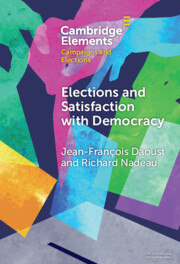Obtaining losers’ consent after an election is often taken for granted in liberal democracies. However, it can pose a real challenge for any type of democratic decision-making in which participants hold conflicting views about the issues of the day. In this research note, we examine losers’ reactions to the votes taken in a citizen deliberative assembly. In such an assembly, much effort is devoted to informing the participants about the merits and limits of various options and ensuring that they form their own reasoned opinions about the issue. Based on this information, people are bound to reach different conclusions, and any vote on a specific option therefore generates winners and losers. While there is a large literature exploring the winner-loser gap in elections, we know little about how participants in a deliberative assembly react when they realize that the assembly chooses a different position than theirs. We leverage data from a citizen assembly held in Canada. We find a high degree of satisfaction with the conduct of the assembly, among both winners and losers.
